Reply To:
Name - Reply Comment
2017 year has been the year of the dengue mosquitoes. It has only been halfway through the year, but the number of dengue patients have spiked like never before. The rise in dengue has itself caused another travesty as hospitals are inundated with fever patients. The atmosphere in both state and private hospitals as of late is a very tense one, with hospital staff attempting to cope with and provide medical treatment to all patients despite the challenge of limited ward space and other facilities. The Daily Mirror visited the leading hospitals in Colombo and its suburbs as the district grapples the burden of dengue.
We witnessed suffering patients in almost all hospitals while undaunted medical staff were providing much needed care, despite the setbacks that have sprouted into existence with the dengue menace.
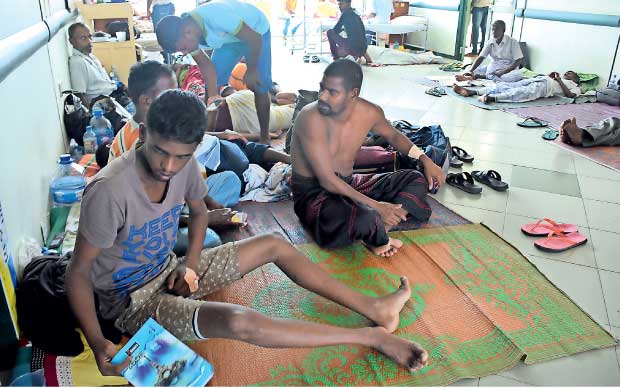
The National Hospital of Sri Lanka, where dengue patients are being accepted day after day, is also faced with the problem of patients outnumbering availability of beds. Upon visiting the wards with dengue patients, we witnessed beds and corridors packed with patients lying on any available space; be it on the floor, benches, foldable beds and the regular hospital beds. Doctors and nurses were bustling through the narrow corridors looking to the needs of patient after patient.
The Dengue High Dependency Unit (HDU) in Ward 55, has been allocated for dengue patients in need of specialised treatment. The Daily Mirror spoke to many patients who were satisfied with the way the doctors and nurses were treating them, despite the severe shortage of beds.
We further learnt from the Deputy Director General of the hospital that the hospital will continue to manage the influx of patients and are increasing facilities available for the accommodation of dengue patients.
We have set up HDUs in all wards
-Dr. Anil Jasinghe, the Deputy Director General
On average, the hospital houses 375 dengue patients, out of which, 75 are in the latent stage. “We have identified and set apart some HDUs in all wards. There are 15 wards and 8 beds in each ward which are set aside for HDU patients. That’s 120 beds in total. Out of these 120 beds, 2 beds in each ward are equipped with a monitor, syringe pump etc; it contributes to 30 beds in total. We are in the process of equipping the ward with 2 more beds in order to increase the total number to 60 beds.”
We have bought 25 foldable beds for the floor patients, so that they are comfortable. We have never stopped admitting patients to the hospital
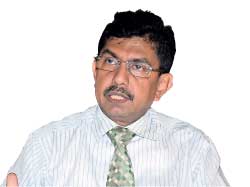 Speaking of the management and of the staff along with the influx of patients, he said, “We have a dedicated nurse for each ward who is trained in dengue care. The doctors too have been trained in dengue protocol management.”
Speaking of the management and of the staff along with the influx of patients, he said, “We have a dedicated nurse for each ward who is trained in dengue care. The doctors too have been trained in dengue protocol management.”
“We have bought 25 foldable beds for the floor patients, so that they are comfortable. We have never stopped admitting patients to the hospital. The consultants discharge the patients when their platelet count goes up. We admit the patients who have the need to be admitted. We have facilities to evaluate each patient before admission. The full blood count tests take 30 minutes to produce results. If the platelet count is not low, then patients could always come back to test themselves.”
In his message to the public in order to avoid the disease progressing into intense stage, “If they are running a fever, by the third day, they should get a medical check up and start on proper treatment. We see when the children or the elderly fall sick they are taken care of from the beginning and precautions are taken. However when it comes to the working people, they neglect their condition take a paracetamol and continue working. What people need to know is, if by the third day the fever does not subside, they should undergo a medical check up.”
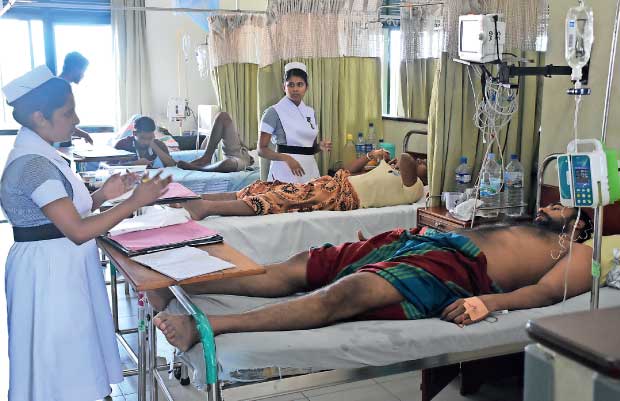
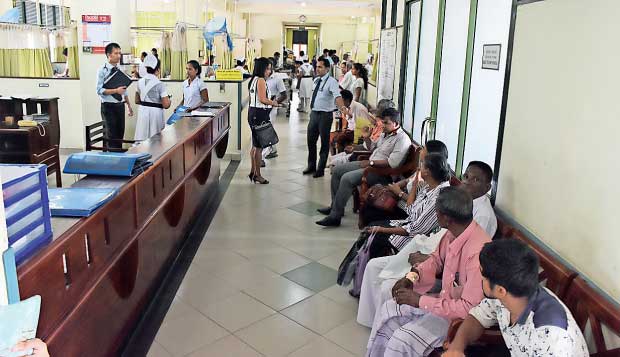
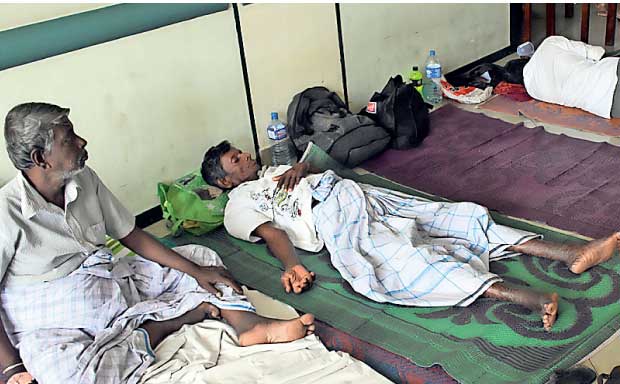
We were tested regularly
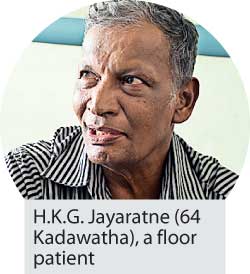 “I have been here for 2 days. Some of the patients don’t have enough beds here but the doctors and hospital staff are taking good care of us. They are all very considerate. They conduct checks whenever they are required and administer relevant medicine. The nurses visit us regularly and check on us for four to five times a day. They take our blood samples and the doctors do the tests. All in all, I am satisfied with the treatment I am getting here.”
“I have been here for 2 days. Some of the patients don’t have enough beds here but the doctors and hospital staff are taking good care of us. They are all very considerate. They conduct checks whenever they are required and administer relevant medicine. The nurses visit us regularly and check on us for four to five times a day. They take our blood samples and the doctors do the tests. All in all, I am satisfied with the treatment I am getting here.”
willing to wait
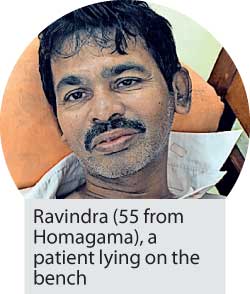 “I was admitted yesterday, I have been on this bench from that time. They are looking into me regularly and the doctors are checking on me. Even if I haven’t been given a bed I wouldn’t want them to remove someone on a bed just because I want a bed, everyone needs one, I have to wait for my turn. I am satisfied with the way they are treating me.”
“I was admitted yesterday, I have been on this bench from that time. They are looking into me regularly and the doctors are checking on me. Even if I haven’t been given a bed I wouldn’t want them to remove someone on a bed just because I want a bed, everyone needs one, I have to wait for my turn. I am satisfied with the way they are treating me.”
I was given a bed
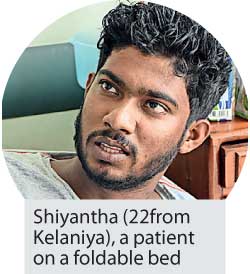 “They are treating us properly and looking after us regularly. I have been here for 4 days; I was transferred from another ward to here. We are checked on around 4 to 5 times a day. The doctor visits me regularly. I was given a bed since the time I was sent to this ward.”
“They are treating us properly and looking after us regularly. I have been here for 4 days; I was transferred from another ward to here. We are checked on around 4 to 5 times a day. The doctor visits me regularly. I was given a bed since the time I was sent to this ward.”
Commendable service by IDH
When Daily Mirror spoke to a few patients who were fresh from being discharged from the Infectious Diseases Hospital (IDH), they readily expressed their views concerning the current situation of the hospital. While noting that there was a great influx in the number of patients being admitted to the hospital, they also appreciated the outstanding service of the hospital staff. They said that the staff were maintaining stringent standards with regard to the proper management of the hospital; this is in addition to handling of the situation professionally with good medical expertise. The following are comments from the patients:
“Hospital environment is very clean”
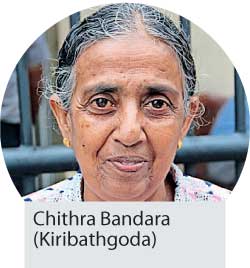 “Currently there is a very big crowd in terms of hospital inmates at the IDH. At least two patients are being accommodated in one bed. However, the patients are being treated with good care and the nurses are very hospitable and kind towards the patients. The hospital environment is also very clean and the treatment is excellent. I believe that the IDH is far better than the other hospitals for treating children”.
“Currently there is a very big crowd in terms of hospital inmates at the IDH. At least two patients are being accommodated in one bed. However, the patients are being treated with good care and the nurses are very hospitable and kind towards the patients. The hospital environment is also very clean and the treatment is excellent. I believe that the IDH is far better than the other hospitals for treating children”.
“No shortcomings in medical treatment”
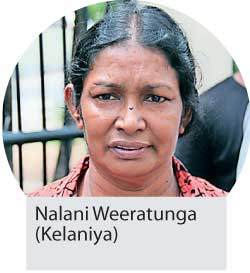 “Despite the large number of patients that are getting admitted to the hospital, we have not witnessed any kind of shortcomings in the medical treatment that we receive. We have never been asked to get our blood count tested from any private clinics. All blood tests are done within the hospital premises. I was receiving treatment here for seven days, and today, I was discharged. I am very happy with the treatment”.
“Despite the large number of patients that are getting admitted to the hospital, we have not witnessed any kind of shortcomings in the medical treatment that we receive. We have never been asked to get our blood count tested from any private clinics. All blood tests are done within the hospital premises. I was receiving treatment here for seven days, and today, I was discharged. I am very happy with the treatment”.
Medical professionals are doing their best
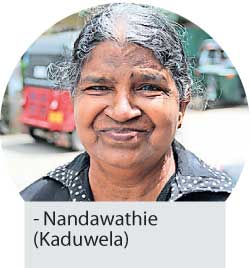 “There are at least two or three patients sharing one bed. It has been three days since my eldest son’s daughter was admitted to the hospital. She has still not fully recovered from the illness. However, the medical professionals are doing everything within their capacity in terms of treatment. Also, it is quite relieving that blood and urine tests are conducted within the hospital premises itself “.
“There are at least two or three patients sharing one bed. It has been three days since my eldest son’s daughter was admitted to the hospital. She has still not fully recovered from the illness. However, the medical professionals are doing everything within their capacity in terms of treatment. Also, it is quite relieving that blood and urine tests are conducted within the hospital premises itself “.
“Treatment methodical despite crowds”
 “Despite being overcrowded, the medical treatment administered to patients is very good and methodical. Blood tests and urine tests are also conducted within the hospital premises as and when needed, without any hassle. My wife was discharged today after being admitted for two days at the hospital”.
“Despite being overcrowded, the medical treatment administered to patients is very good and methodical. Blood tests and urine tests are also conducted within the hospital premises as and when needed, without any hassle. My wife was discharged today after being admitted for two days at the hospital”.
Eradication of dengue must be carried out effectively
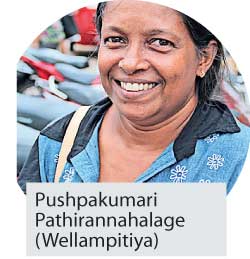 Although patients are being accommodated in separate wards depending on their illnesses, we noticed that most beds are shared by two to three patients. The medical service is excellent and patients are being monitored on hourly basis. My husband was admitted to the hospital day before yesterday and he is still receiving treatment for dengue. I strongly believe that the root causes for the spread of dengue should be addressed by relevant authorities in an effective manner. We could have minimized the threat of dengue if drainages, canals and the surrounding environment were effectively cleaned.
Although patients are being accommodated in separate wards depending on their illnesses, we noticed that most beds are shared by two to three patients. The medical service is excellent and patients are being monitored on hourly basis. My husband was admitted to the hospital day before yesterday and he is still receiving treatment for dengue. I strongly believe that the root causes for the spread of dengue should be addressed by relevant authorities in an effective manner. We could have minimized the threat of dengue if drainages, canals and the surrounding environment were effectively cleaned.
Patient attention highly commendable
The Daily Mirror visited the wards of the Kalubowila Colombo South Teaching Hospital scoping out the dengue challenge at the hospital. It was indeed a very hectic environment with throngs of fever patients admitted to the wards while many more remained seated outside awaiting admission. Among the fever patients, there were confirmed dengue cases as well as suspected dengue cases waiting for their medical reports. It was quite clear that the ward facilities were running out with respect to the increasing number of patients.
But despite all difficulties, the hospital staff seems to be managing the chaotic hassle giving priority to the dengue patients though it indeed appears a very tedious task.
Kalubowila Hospital Director Dr. Asela Gunawardana
“We have 340 dengue patients admitted to the hospital at present. A rise in patients are expected if the rains continue. We are planning to streamline OPD admission by encouraging people to stay at home and get bed rest unless the condition is critical. The admission condition is the platelet count is below 130,000 to minimize influx of patients. Amidst other measures, we are hoping to allocate free beds in 2 post-natal wards for patients recovering after a critical condition of dengue. This will make more room for acute dengue patients.”
Hoping to allocate free beds in 2 post-natal wards for patients recovering after a critical condition of dengue. This will make more room for acute dengue patients
Beds outnumber patients
 Rathna Moratugoda, a grandmother who had come to get her granddaughter discharged also spoke about the dedication of the hospital staff. The ward where her granddaughter was receiving treatment had 40 beds which were outnumbered with over a 100 patients where 60-70 of the patients were suffering from dengue. “My granddaughter was in haemorrhagic state when she was admitted, but thanks to treatment she is out of danger now and getting discharged today.
Rathna Moratugoda, a grandmother who had come to get her granddaughter discharged also spoke about the dedication of the hospital staff. The ward where her granddaughter was receiving treatment had 40 beds which were outnumbered with over a 100 patients where 60-70 of the patients were suffering from dengue. “My granddaughter was in haemorrhagic state when she was admitted, but thanks to treatment she is out of danger now and getting discharged today.
There is no time to rest
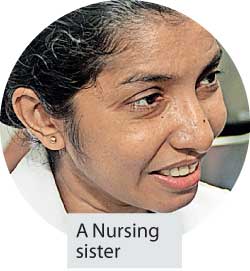 Liyanage, a nursing sister at one of the female medical wards said, “Our ward has 46 beds. Just this morning, the admission of patients rose to 115 to that ward. Among these patients, 48 are suffering from dengue and are under intense monitoring. Other patients have been admitted upon suspicion of dengue. Eight nurses are assigned for day duty, while five handle the night shift. There is no time to rest. However, we stick to strict monitoring and give priority to the dengue patients.”
Liyanage, a nursing sister at one of the female medical wards said, “Our ward has 46 beds. Just this morning, the admission of patients rose to 115 to that ward. Among these patients, 48 are suffering from dengue and are under intense monitoring. Other patients have been admitted upon suspicion of dengue. Eight nurses are assigned for day duty, while five handle the night shift. There is no time to rest. However, we stick to strict monitoring and give priority to the dengue patients.”
However, the difficulties faced are not one-sided just to the hospital staff, but despite facility issues, the patients seem to be happy with the treatment that they are receiving.
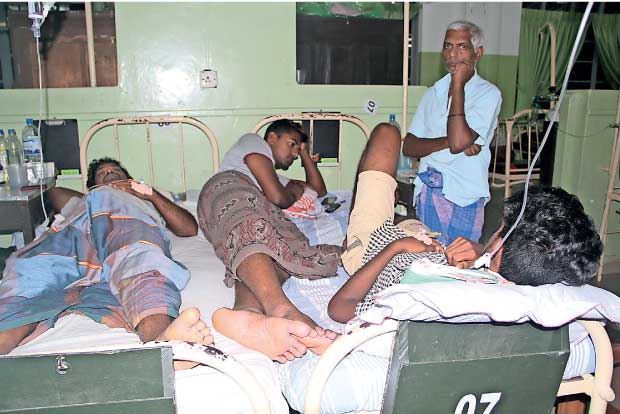
Patients at the Colombo North Teaching Hospital in Ragama revealed that the hospital has been carrying out all tests, including full blood counts. Except for a few cases, all patients in ward 9, had been admitted immediately while there were also a patients suspected with dengue. The ward housed 42 dengue patients with eight other patients who are at the dengue haemorrhagic stage. More than three patients were on the floor, due to shortage of beds in the ward.
We were also informed of several unconfirmed patients. During our time of visits, beds were placed in corridors which were being prepared for new admissions.
Dr. Vajira Dissanayaka
Deputy Director - Colombo North Teaching Hospital, Ragama
“There were around 243 dengue patients by Monday with 98 cases with internal bleeding. Dengue patients are admitted to seven medical emergency wards plus three paediatric wards. A ward is usually equipped with 42 beds but since it is an emergency situation we cannot exactly state the number of beds.”
Commenting on the number of the admissions, Dr. Dissanayaka said “Dengue cases are increasing when compared to last month. The daily admissions last month ranged between 150 - 200 but now it is 250 - 300.”
Dr. Dissanayaka has also advised those suspected to have been infected with dengue to admit themselves at the hospital as soon as possible. She said patients should stay at least two days in the hospital to confirm whether they have dengue. If the platelet count is below 130,000, we strongly advise to seek medical attention immediately, and if it is above 160,000, it is advisable to rest at home.”
Dengue cases are increasing when compared to last month. The daily admissions last month ranged between 150 - 200 but now it is 250 - 300
 “I have been here for a week, but only received a bed after waiting for more than a day. Until then I was seated in a chair. There were some patients on the floor, even on the pavement. The patients have been sharing spaces together due to the lack of beds. Critical and undiagnosed patients are also there.”
“I have been here for a week, but only received a bed after waiting for more than a day. Until then I was seated in a chair. There were some patients on the floor, even on the pavement. The patients have been sharing spaces together due to the lack of beds. Critical and undiagnosed patients are also there.”
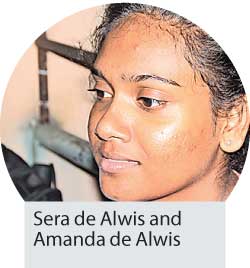 “Doctors have been very attentive and all the tests were done by the hospital staff. The only problem here is the lack of space. I was in the ward for four days and I was sharing a bed with another.” There are untrained janitors and wash rooms are not clean all the time.”
“Doctors have been very attentive and all the tests were done by the hospital staff. The only problem here is the lack of space. I was in the ward for four days and I was sharing a bed with another.” There are untrained janitors and wash rooms are not clean all the time.”
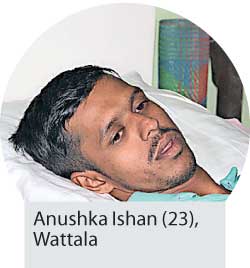 A dengue haemorrhage patient who had checked his blood platelet count from a private channelling centre, was admitted to the hospital after waiting for 48 hours. He was given the corner most bed which was made by assembling three beds, he has to share it with four others. He had a bed of his own, which was after an unfortunate death of another patient.
A dengue haemorrhage patient who had checked his blood platelet count from a private channelling centre, was admitted to the hospital after waiting for 48 hours. He was given the corner most bed which was made by assembling three beds, he has to share it with four others. He had a bed of his own, which was after an unfortunate death of another patient.
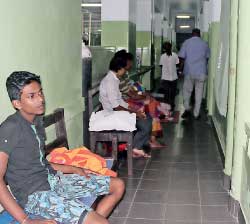
benched for treatment
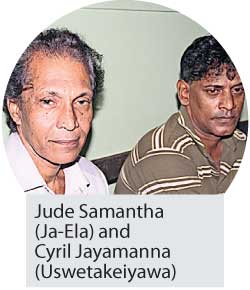 Both were on the corridor of ward No. 9 seated on the bench. He said that the corridors are congested at night, as the admissions are high during the night. Cyril was suffering from an invading germ, while Jude was admitted with a chest pain. Chathura Madhushanka who was not diagnosed with dengue at the time of our visit, was also advised to rest on the bench on the corridor, in order for him to receive treatment if necessary.
Both were on the corridor of ward No. 9 seated on the bench. He said that the corridors are congested at night, as the admissions are high during the night. Cyril was suffering from an invading germ, while Jude was admitted with a chest pain. Chathura Madhushanka who was not diagnosed with dengue at the time of our visit, was also advised to rest on the bench on the corridor, in order for him to receive treatment if necessary.
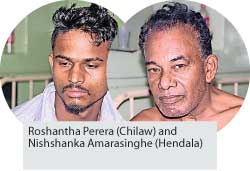 “I was admitted when the platelet count was around 91”, said Roshantha. He was also a patient sharing the corner most combined bed. Nishanka, in the adjoining bed had been in the hospital for four days and his platelet count decreased to 36.
“I was admitted when the platelet count was around 91”, said Roshantha. He was also a patient sharing the corner most combined bed. Nishanka, in the adjoining bed had been in the hospital for four days and his platelet count decreased to 36.
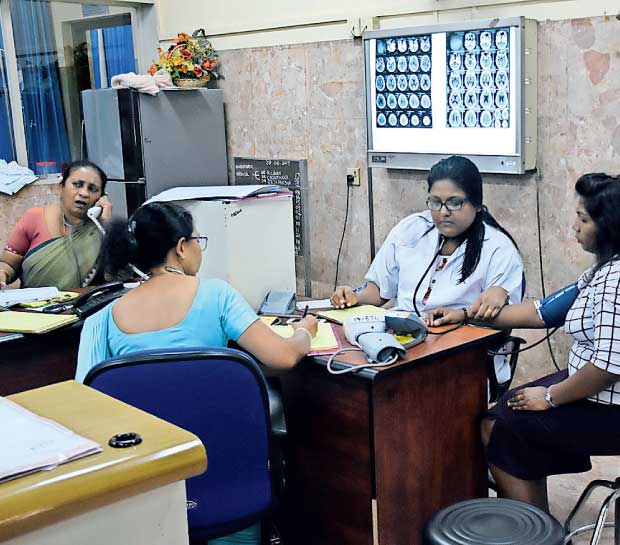
The Jayawardenapura Hospital made headlines over the past few days as reports emerged that the hospital had temporarily suspended the admission of fever patients. As we entered the hospital, a notice at the entrance read suggesting the same. However speaking to the Daily Mirror, the Deputy Director of the hospital Dr. Santhusha Fernando said that the hospital is well equipped and is familiar in managing the epidemic.
Deputy Director, Sri Jayawardenapura Hospital in her comments:
 With the influx of patients, the rate of admission is very high, as there is a very high incidence of dengue in the Colombo district. Most people are very aware of the situation nowadays. The moment they suspect dengue, they get themselves tested from outside by a General Physician or by themselves. They demand for admission as they are scared of the disease. There is a concurrent flu epidemic as well.
With the influx of patients, the rate of admission is very high, as there is a very high incidence of dengue in the Colombo district. Most people are very aware of the situation nowadays. The moment they suspect dengue, they get themselves tested from outside by a General Physician or by themselves. They demand for admission as they are scared of the disease. There is a concurrent flu epidemic as well.
Clarifying the controversy surrounding admissions, Dr. Fernando said the hospital functions in a methodical manner to ensure the best care for patients. “At our hospital, even if a patient is discharged we need a bit of time to settle their records because this is a fee levying hospital. We need time to write their diagnosis cards, to give them advice and to get them down from the bed. We also need time to sanitise the beds and prepare for the next patient as we have to adhere to the standards of hygiene”.
“When we are inundated with patients, we can’t cope with these processes. So from time to time, according to the bed availability we have been forced to shut down the hospital for a few hours, to get our bed management in order. But we have never closed down the hospital as it has happened in some other government hospitals,” she said.
“The hospital was temporarily closed for admissions only on four occasions; for a few hours. The closure was not for more than four hours. There has been information circulating that so many patients were turned away. Those were the result of patients being agitated when they were turned away or asked to wait for two or three hours”.
Asked if the beds are sufficient to house patients, the Deputy Director said the hospital is equipped with approximately 1080 beds. “The usual standard of a hospital at any given point, we expect the best saturation of beds to be 80 percent of the total number of beds. About 15 to 20 percent of beds in any hospital should be kept vacant in the case of a disaster or accident. We do have beds but we cannot adhere to standards of bed management with the influx of patients. We can manage and we are geared to manage this situation. But due to the public response to fever we are faced with a delay and difficulty in managing the beds. The situation is not as bad as it has been portrayed. We have increased the number of day beds at our Emergency Treatment Unit (ETU) where patients with dengue can wait for their blood count”.
We rationally decide if the patient can be sent home and ask them to return the next day
“With our clinical judgment we rationally decide if the patient can be sent home and ask them to return the next day if they are from the vicinity. If they are residents of faraway places we still admit such patients. The hospital has dedicated three medical wards headed by three consultants and staff of varied expertise, with 10 to 12 medical staff attending to each ward. Wards dedicated for other illnesses are also cooperating with dengue management and are offering a percentage of their wards to house dengue patients, depending on the requirement. We have provided dengue training to doctors in the outlier wards, refreshing their skills and knowledge on dengue management,” Dr. Fernando opined.
The Jayawardenapura Hospital is geared to face challenges the Deputy Director said citing the staff’s experience in managing patients. “During the time of the war, we had a high influx of military casualties, so we were used to very intense workloads and coordination between our wards. Our laboratory staff and radiology staff have been providing a dedicated service, as dengue patients have to undergo frequent tests and scans, I can confidently say that our hospital is well geared to manage the situation”.
- Dr. K.V.C. Janaka Emergency Treatment Unit, J’pura Hospital
Dr. K.V.C. Janaka who has been on the front-line of dealing with the heavy influx of dengue patients at the Jayawardenapura hospital admits that the number of dengue patients has put medical services under strain. “We have a huge influx of patients this year. On Tuesday evening, there were 135 suspected dengue patients coming in. The total number of for a day ranges from 250 to 300 patients whereas the hospital has about 1000 beds. Therefore we find it difficult to cope with the situation.”
“We have been adhering to the national guidelines and have only been admitting patients with a platelet count below 150,000 depending on our clinical judgment. We have to select the patients who are really in need of hospital care and we can’t admit all patients for nursing care.”
We are now grappling with practical issues in treating patients
“Colombo district obviously has the highest burden but the death rates at our hospital have been below the national level. The dengue virus type 2 is a new strain to our population. Therefore a large number of people have been presenting with symptoms. The previous types of dengue saw a certain degree of resistance. But the changes in the weather pattern may have caused this epidemic. The number of dengue cases are very high this year and we expect it to rise by July.”
“We are now grappling with practical issues in treating patients as our staff has to take hourly measurements from about 40 patients in a ward. Our staff can handle the situation but they are under immense stress when the numbers are this high.”